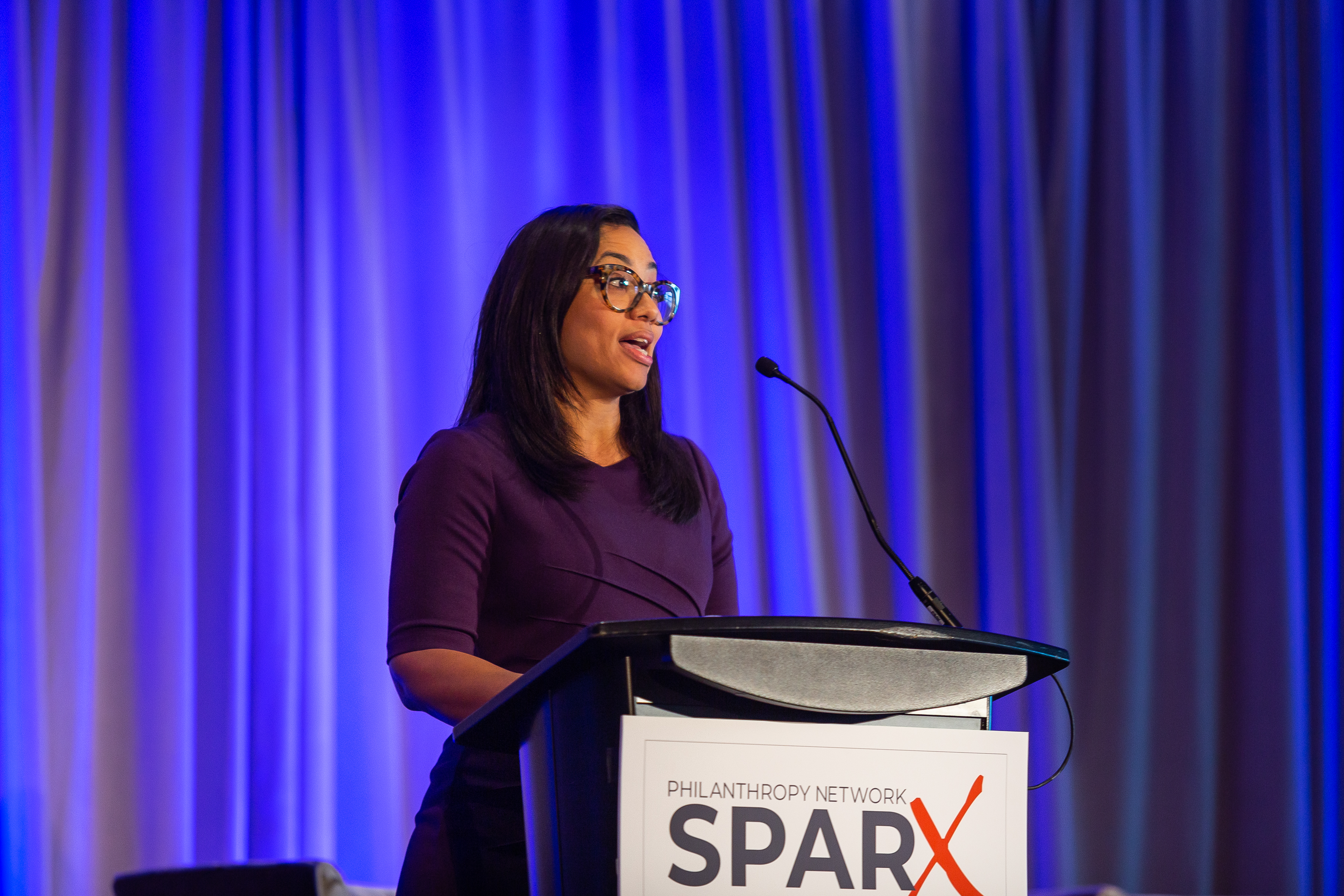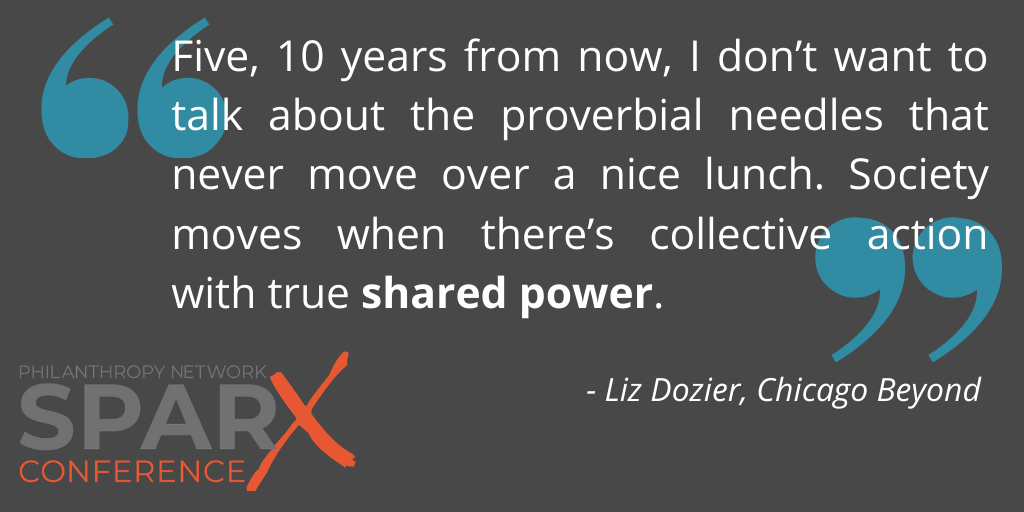By Anh Nguyen
American philanthropy has dealt with the same issues for generations, Liz Dozier pondered aloud, “if we’re so good, why are we still in business?”
Addressing the crowd at SPARX Conference 2019, Dozier, now a social-impact investor with the firm she founded, Chicago Beyond, is dismantling the top-down approach in American philanthropy based on the premise that those who have the money also have the answers. Years of working inside the Chicago School District and leading one of its worst-performing schools have lifted the veil for Dozier. “Philanthropy creates the same power imbalance in society, and we need to resist it,” she said.
When Dozier started as principal at Fenger High School, education was barely happening, so she took a hard stance against “troublemakers.” From her own strict upbringing, she drew on the belief that rules and discipline were what her students needed. Tough love, as her mom, a former Catholic nun, had taught her, might just work.
Dozier shared CNN-captured footage at SPARX of her rounding up students on the street who’d skipped school. She chased them on foot for several blocks and broke her heels, but the students looked on unsympathetically. The draconian rules didn’t work. After a year and a half, nothing changed.
Dozier turned to the people around her for answers and before long, she realized she was part of the problem.
“I was perpetuating a cycle of hopelessness,” she said. “I had asked the wrong question, ‘What is wrong with you?’ instead of ‘What has happened to you?’.”
To unlearn the biases and assumptions about her students and the neighborhood, Dozier changed her administration and made it more inclusive of students’ needs. By starting to listen, her outlook on where education stands in her students’ lives also changed.
“Kids act out because they don’t have control over their lives,” she said. Fenger needs to be “a refuge.” “We came to accept that our kids are smart and know how to shape their destiny.”
Dozier made a point to visit students’ homes and talk to people, like school janitors, who knew the students and influenced them in nontraditional ways. She created behavioral health teams to turn the school into a place of emotional safety and let her students regain a measure of control over their lives.
The results were dramatic. The graduation rate jumped from 40 to 80 percent while school arrests went down from 300 a year to 10, with more kids graduating with college credits than many other high schools. The drop-out rate plummeted to only 2 percent. The behavioral health team Dozier pioneered later spread across half the Chicago school district.
At this turning point in her career, Dozier took to heart the importance of social justice-minded work in tackling social ills, which was often overlooked in a philanthropy setting where grants are given out with specific agendas and outcomes in mind. The focus should be shifted to identifying who has power and empower those who don’t.
“The best solution can be found within the community,” Dozier said.
With Chicago Beyond, Dozier was able to bring her philosophy to life.
Her organization identifies seven components of power -- Authorship, Access, Accountability, Ownership, Value, Validity and Information -- and sets out to uplift and assist organizations and people in attaining these key pillars.
On Access, her firm broke with tradition to make big investments in new promising organizations and help them get out of the cycle of small nonprofits struggling to expand because no one believes in them.
In 2016, Chicago Beyond invested $1 million dollars in Dovetail Project, at the time an early-state nonprofit, and its 12-week program for young African American fathers to learn the skills and gain the support they need to be better fathers for their children and better men in their communities.
“It turns out to be the best investment we’ve made in people,” Dozier said.
But it took time to get buy-in from those who are wary of the non-traditional grant-giving model. The Lawndale Christian Legal Center, a wraparound of the legal system for youths and young adults, initially rejected Chicago Beyond’s investment offer of $1.6 million dollars because it didn’t want short-term gains to impact its long-term mission.
Chicago Beyond held a peace circle about equity that recognized the center’s concerns and highlighted the power element of Accountability it brought to the table.
“We are accountable to these kids,” Dozier said. “We’re here to learn about folks, steer past unauthentic ways, change our individual consciousness, improve connection and emphasize solidarity.”
The legal center took the investment and expanded their services to more young people in North Lawndale while staying true to their original mission. It’s another example of how Dozier was able to shed the “alpha” mindset of territory marking and allow others from the community with the experience and understanding to step up and take control.
Chicago Beyond is veering away from the top-down closed-door philanthropy of the past and toward a “whole philanthropy” approach where the decision-making process goes hand in hand with restorative justice, equity and solidarity.
Dozier’s voice lifted when she shared a pilot program Chicago Beyond and partners are pioneering for kids to have quality time with their parents who are currently incarcerated. Last month, the first cohort of five fathers and their children got the chance to meet for two hours outside a prison setting and tour the Chicago Children’s Museum.
Research shows that recidivism is reduced if parents have a closer relationship with their children. It took Dozier and her team a year to convince the Cook County Police and Sheriff’s Department to take part in the program. But the tear-inducing sight of children rushing to their fathers’ side and the dignity and bond the whole experience brought to the first cohort were all worth it.
In January, a family space will be opened in one of the county jails, designed by the museum to help foster family connection. With more than 30,000 kids impacted by incarceration across the country, this small step in the right direction exemplifies Dozier and Chicago Beyond’s “use power to empower” approach.
“Five, 10 years from now, I don’t want to talk about the proverbial needles that never move over a nice lunch,” Dozier said. “Society moves when there’s collective action with true shared power.”
There’s truth in the quote from Jennifer Lopez’s stripper character in the movie Hustlers: “The world is a strip club. You have people tossing money and people doing the dance.” It is how things get done in philanthropy for as long as philanthropy has existed, Dozier said. But with Chicago Beyond and other social justice-minded organizations, it doesn’t have to be that way.
Anh Nguyen is a recent graduate from Klein Communications School at Temple University and a 2019 Lenfest Next Generation Award winner.


